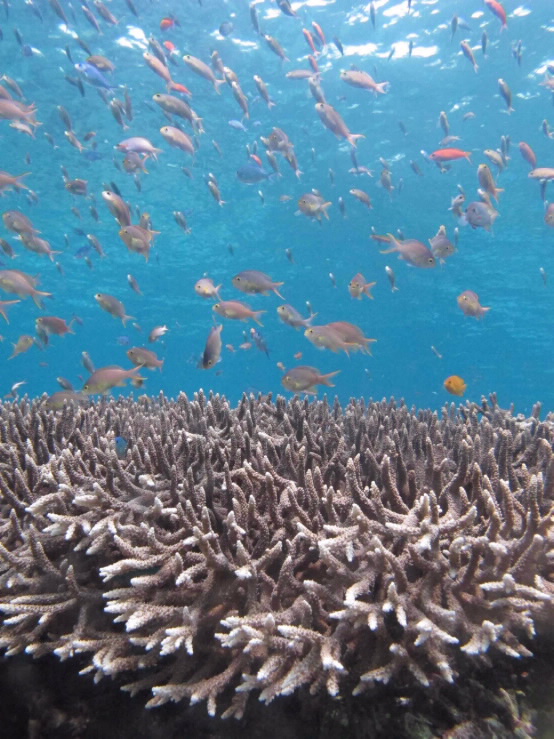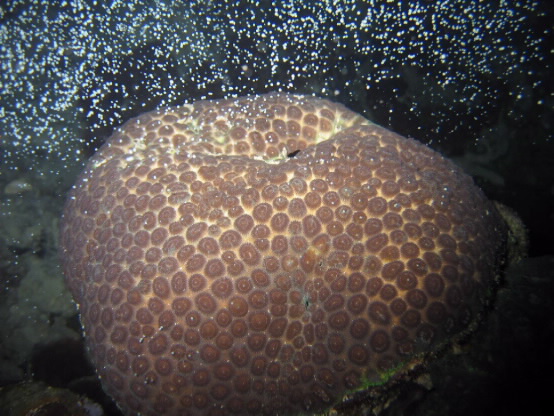Media Releases
More coral babies staying at home on future reefs

Photo credit: Professor Andrew Baird, ARC Centre of Excellence for Coral Reef Studies (Coral CoE) at James Cook University.
Researchers have discovered that rising ocean temperatures due to climate change will see reefs retaining and nurturing more of their own coral larvae, leaving large reef systems less interconnected and potentially more vulnerable.
“We found that at higher temperatures more coral larvae will tend to stay on their birth reef,” says the lead author of the study published today, Dr Joana Figueiredo from the ARC Centre of Excellence for Coral Reef Studies (Coral CoE) at James Cook University.
“This is good news in an otherwise cloudy picture for isolated reefs, because in the future they will be able to retain more of their own larvae and recover faster from severe storms or bleaching events,” she adds.
Professor Sean Connolly, also from the Coral CoE, explains that while more coral larvae will stay close to their parents, fewer will disperse longer distances, leaving reefs less connected.
“The loss of connectivity can make reef systems such as the Great Barrier Reef more vulnerable,” he said.
“So interconnected reef systems that depend on the recruitment of coral larvae may take more time to recover after a disturbance, such as a cyclone, because fewer larvae will disperse from other reefs to the disturbed reef.”

Photo credit: Professor Andrew Baird, ARC Centre of Excellence for Coral Reef Studies (Coral CoE) at James Cook University.
Professor Connolly adds that weaker connections between reefs mean warm-adapted corals, such as those in the northern Great Barrier Reef, may take longer to expand their ranges to the south.
Similarly for isolated reefs, Dr Saki Harii from the University of the Ryukyus says, “while isolated reefs can retain more of their own larvae, this also leaves them with fewer possibilities to change their species composition to adjust to climate change.”
Professor Andrew Baird from the Coral CoE says the implications of the research present management with both challenges and opportunities.
“Our results demonstrate that global warming will change patterns of larval connectivity among reefs. On a positive note, the stronger link between adults and recruits means an even greater benefit if we reduce local threats such as dredging and fishing methods that can damage corals,” Professor Baird says.
Nevertheless, he explains, “This does not reduce the need for global action on climate change.”
‘Increased local retention of reef coral larvae as a result of ocean warming’ by Joana Figueiredo, Andrew H. Baird, Saki Harii and Sean R. Connolly appears in Nature Climate Change.
The paper is available on request.
For interviews contact:
Dr Joana Figueiredo, Coral CoE, (and now at Oceanographic Center at Nova Southeastern University), +1 954 262 3638, jfigueiredo@nova.edu Prof Sean Connolly, Coral CoE, (07) 4781 4242, sean.connolly@jcu.edu.au Prof Andrew Baird, Coral CoE, (07) 4781 4857, andrew.baird@jcu.edu.au Dr Saki Harii, University of the Ryukyus, +81-980-47-6073, sharii@lab.u-ryukyu.ac.jp Media contacts: Melissa Lyne, Coral CoE media liaison, 0415 514 328, melissa.lyne@gmail.com Richard Davis, Head of Media and Communications, James Cook University (07) 4781 4822 / 0413 451 475 Issued April 29, 2014